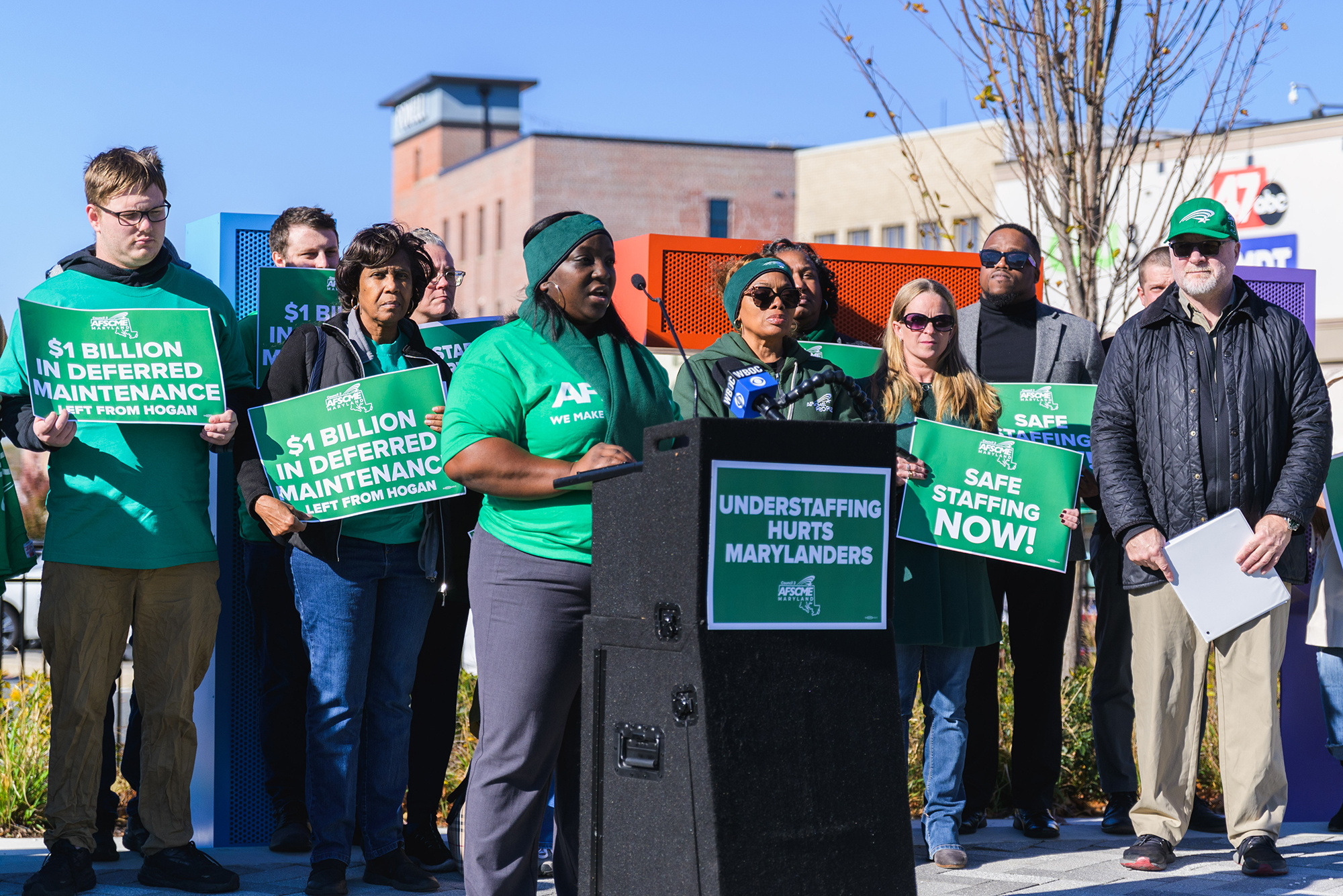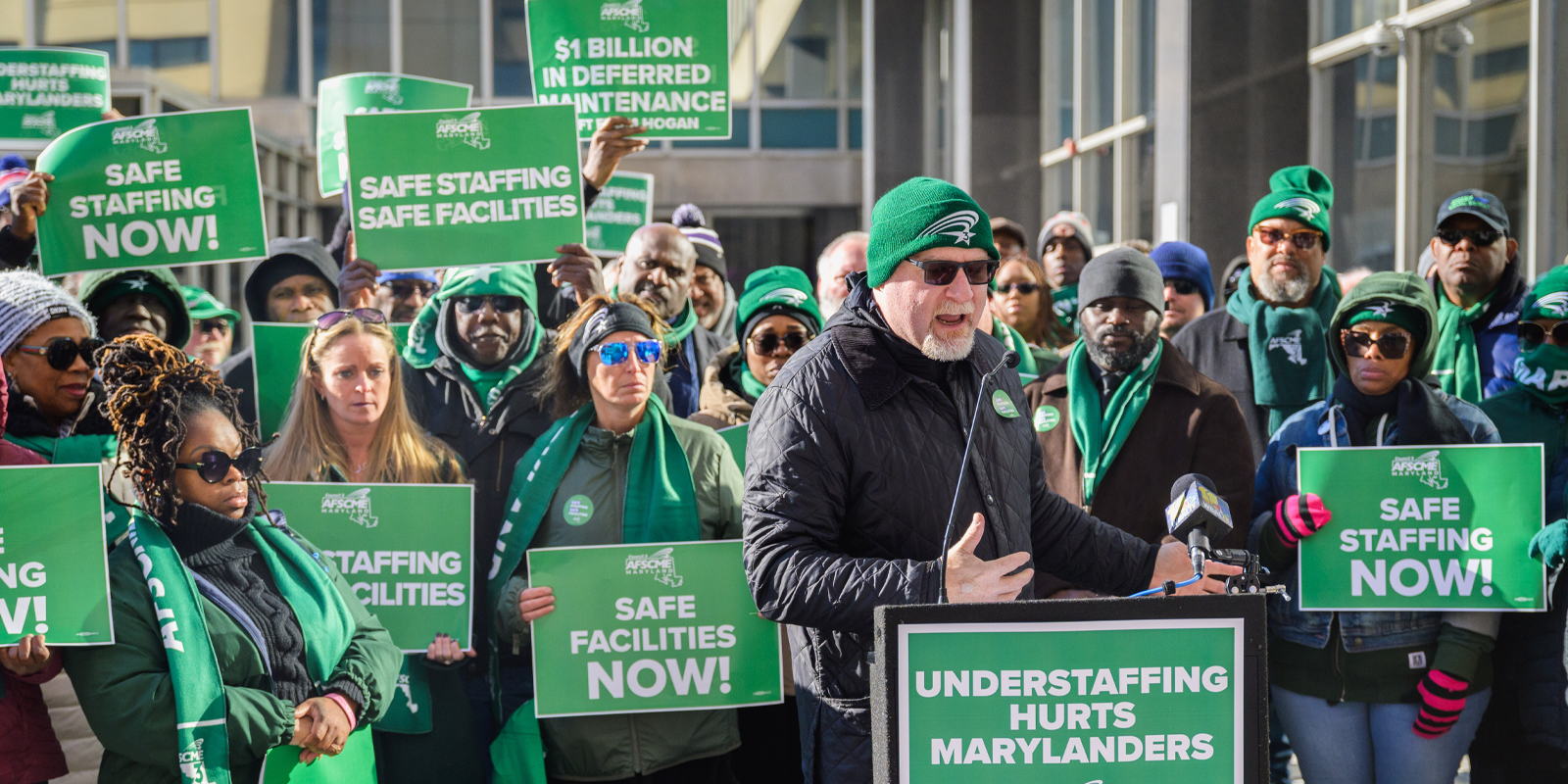
BALTIMORE – Maryland state workers are struggling to serve their communities due to short staffing, crushing workloads and outdated facilities. And they are going around the state calling the public’s attention to these problems.
On Dec. 3, members of AFSCME Maryland Council 3 — which represents more than 20,000 state employees — held a rally in Baltimore to shine a light on myriad problems facing the state’s workforce.
The Baltimore rally was just the latest of these events. Council 3 members also held rallies in Hagerstown in western Maryland in October and Salisbury on the Eastern Shore last month. A rally is planned for Dec. 19 at two correctional institutions in the western Maryland city of Cumberland.
The problems Council 3 members are spotlighting all stem from years of underinvestment by former Gov. Larry Hogan. The issues include dangerously low staffing levels, skyrocketing vacancy rates, impossible workloads and caseloads, and nearly $1 billion in deferred maintenance for state facilities left over from Hogan’s administration. The facilities in need for repairs and upgrades include state hospitals, correctional facilities and juvenile detention facilities.
Making matters worse, the State Center complex in Baltimore — where Council 3 members held their rally — is also battling a Legionella outbreak.
Council 3 members’ demands for safe staffing and safe facilities include:
- A comprehensive staffing plan with a timeline and commitments to recruit, hire and retain qualified staff for each agency.
- An assessment of the maintenance backlog at state facilities and a plan to address the issues and procure adequate funding.
- Implementation of a comprehensive and adequate heat standard for all state facilities as well as a capital funding campaign to provide air conditioning in all facilities.
- A facilities plan with timelines and a commitment to improve poor conditions that create health hazards for those living and working in state facilities as well as a safety plan to reduce violence.
“Now is not the time to shy away from the budget crisis our state is facing. And in order to tackle this crisis in a sustainable way, our state leaders must be bold about growing the revenues that our state needs. That means closing tax loopholes that only benefit large corporations. That means making the ultrawealthy pay their fair share,” said Council 3 President Patrick Moran, who’s also an AFSCME vice president.
Here are the perspectives of some state workers from across Maryland:
“A normal workload for me would be fixing six vehicles a day, but these days I’m easily tasked with fixing 10 to 12 vehicles. We’re rushing to complete work because we don’t have enough folks to help, and the training that new employees receive is far from adequate. To make matters worse, the buildings we work in are leaking and insulation is literally falling from the ceiling.” – Bryan Goodman, president of AFSCME Local 174 in Baltimore and a heavy equipment maintenance technician at the Maryland Aviation Administration.
“Every day at the beginning of our shifts, we don’t know if we’re going to be able to go home at the end of the night. We don’t know if we’re going to be forced to work another double and go another day without seeing our families. Or worse, be wheeled to the hospital because we’ve been injured.” – John Feeley, president of AFSCME Local 1772 in Hagerstown and a correctional officer sergeant at the Maryland Correctional Training Center.
“Our hospital is vitally important to our community, and if we just invested in our hospital and the staff, we could ensure more patients can get the long-term and specialized care they might need. We have entire units that we are not utilizing. We have floors where we’re only housing eight patients but have space to house 24.” – Christine Duffy, president of AFSCME Local 1081 in Salisbury and a geriatric nursing assistant at Deer’s Head Hospital Center.
